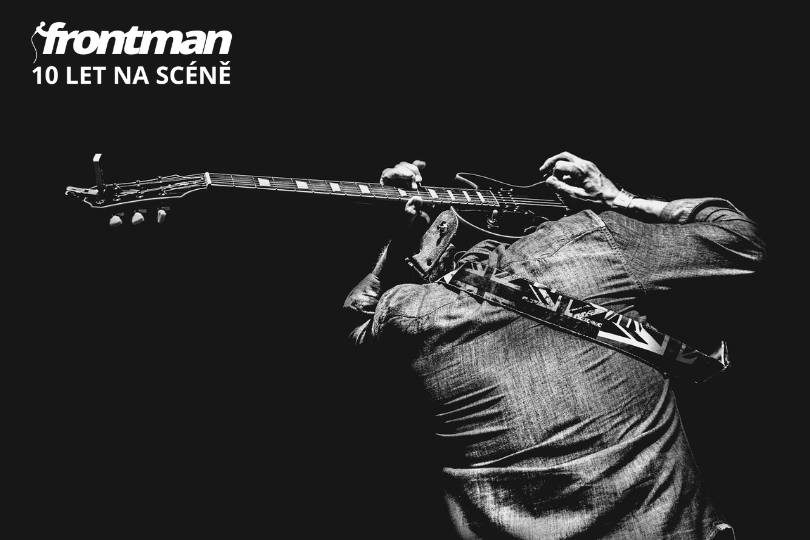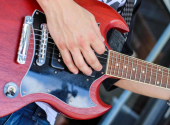
TOP 5 Tips How to Practice an Instrument More Effectively
What is the difference between learning and practising? When we are about to practice guitar, bass or drums, usually we wouldn't say, “I’m going to learn.” Learning only applies to complete beginners, doesn't it? They need to learn an instrument because they can’t play it properly yet. Once we get into the category of more advanced musicians, we say we’re going to “practise”. But isn’t it really the case that we’re still learning? And what’s the difference between learning and practising? In addition to answering the above questions, today I’d like to give you the TOP 5 tips for improving your musical skills without increasing the number of hours you spend in the practice room with an instrument in your hands. It’s not about the number of hours but the quality.
1. Learning comes first
A musician would say: "I'm practising my instrument". If someone is "learning an instrument", it automatically means they are a beginner. This is a fundamental difference in common musical practice. However, I would like to get you to be more aware of the difference between practising something we know well (a favourite scale or pentatonic scale, chords, or pieces) and learning a new skill (such as reading and playing from sheet music, new scales, chords, and especially pieces). Learning is always outside our comfort zone.
If you're getting familiar with a new song that you've never played before, you need to listen to it first (probably multiple times) before you start learning the bass line, guitar solo, or chord sequence in the first verse. The same goes for anything new you learn in music. First, you get familiar with the new material, then you try to understand it and figure out what it actually entails in very small steps. On the other hand, if you're practising something, that means it's material you already know, and you may be trying to play it faster or you use it as a warm-up.
Another pitfall of the exercise process is the fact that, unknowingly, practising the wrong way, you may be ingraining bad habits. If you learn some technique the wrong way at the beginning or are convinced that, i.e. a C major chord is played with a minor third between the first and second notes, you may adopt these mistakes into your practice routine. Flawed processes, techniques and routines are mainly the concern of self-taught musicians who learn by trial and error and cannot always arrive at an optimal result. I'm sure you know that type of musician – they have been playing for years, and you don't see any development or improvement in them.
Therefore, perceive the difference between learning and practising in your approach to "practising the instrument". Of course, there's no need to be nit-picky and change the set phrase or to take someone at their word about "learning versus practising". We know what we're after, don't we?
2. Challenges of new skills
Practising an instrument can very often turn into a mechanical affair, with the player focusing on technical mastery of the instrument and using the much-loved tabs or tutorial videos instead of their own ears. Yes, if you want to play your favourite songs as soon as possible, learn the basic techniques of playing and then hurrah for YouTube, where you can find a video of someone playing the song along with tabs or transcription. There are also attractive programs or apps that treat learning an instrument like a fun video game. This all has its place in music education, and I'm glad that thanks to it, millions of people are playing who might not have the courage to pick up a guitar, bass or drumsticks.
However, if you are serious about music and want to go deeper, you need to enrich your development with new approaches and skills. It's definitely a good idea to learn to read sheet music, train your ears and also try singing. Mastering basic recording techniques and DAW software doesn't hurt, either. Can you write lyrics? Do you know music theory or history? This all adds up to a comprehensive music education puzzle that will set you apart from the crowd of aspiring musicians.
3. Routine versus ritual
And once again – a linguistics window. Routine is a very common killer of inspiration. On the other hand, it is a very important element in everyday practice. You need to master a certain routine for technical exercises and also to determine when, where and how you practice. But you can elevate the routine to a ritual, where you embrace your music practice with an instrument in hand as something special. You turn off your phone, prepare your room, brew a cup of tea or coffee ahead of time, and immerse yourself in your world of music.
The quality of time and attention you give to playing (or singing) is the most important thing in the practice process. If I play four bars of exercises (songs, études) with maximum concentration for half an hour, paying attention to every single note, it is much more effective than three hours of running along the fretboard, jamming or watching some "guaranteed tips and tricks" on TikTok.
A player who practices for half an hour every day with a clear plan and maximum concentration will make far more progress in a month than a player who practices two hours a day but doesn't notice his tone, phrasing or just jams for fun. You don't have time to waste time. Jamming and spontaneity have their unrepresented place in music, but you need to get a solid foundation first. Otherwise, you'll never sound good and you'll always be tormented by that feeling that you're not quite there yet.
4. Accuracy versus speed
If you focus on precision and accuracy in your training process, you are always on the right track. Do you want to learn your favourite piece? Feel and listen to all the details of your part. Do your notes have the correct length? Accents? Dynamics? Phrasing? What about your tone? Does it match the original? Be pedantic in your copying.
If you play sheet music, learn the part perfectly. Work again and again on optimal fingering, ease of playing and tone quality. Play one bar over and over. Then the second. Then two bars in a row. Divide even the most difficult part into playable segments and then put them together. It never pays to practice fast and sloppy. Your playing will be unclear and hard to communicate to the listener. Accuracy, quality and clarity always take precedence over speed.
5. Reward
Don't forget to reward yourself after a job well done. Play your favourite song (that you've played a thousand times but still enjoy), just strum along and jam, or turn the volume up to 11 and plug in a new wah-wah pedal. Relax, shut off your brain and play. You deserve it after the focused practice that just saved you hours, days and months of futile effort and frustration.
If you have found an error or typo in the article, please let us know by e-mail info@insounder.org.





